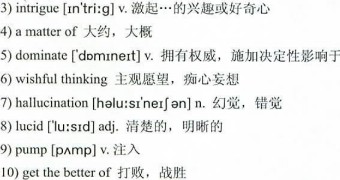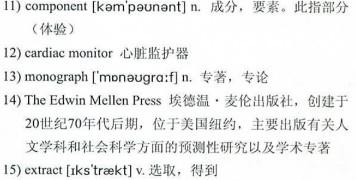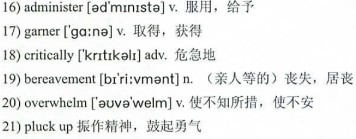 “死亡”,一个人们不会轻易去触碰的字眼。而“濒死体验”对普通人来说,不但显得遥远,且总有一种神秘感。实际上,许多人在面临死亡时,都或多或少地有过一些感受。美国前总统克林顿在其自传《我的生活》中就提到,他曾在接受心脏手术时产生了濒死幻觉——处于麻醉状态时的他见到了许多古怪的面孔。
“死亡”,一个人们不会轻易去触碰的字眼。而“濒死体验”对普通人来说,不但显得遥远,且总有一种神秘感。实际上,许多人在面临死亡时,都或多或少地有过一些感受。美国前总统克林顿在其自传《我的生活》中就提到,他曾在接受心脏手术时产生了濒死幻觉——处于麻醉状态时的他见到了许多古怪的面孔。
“濒死体验”一词于1975年由做濒死研究工作的美国内华达大学教授雷蒙·穆迪提出。穆迪博士在对100例有过“濒死体验”的病例进行研究后,完成了Life after Life(《生命之后的生命》)一书。此后,对“濒死体验”进行研究的科学家越来越多,1978年,国际“濒死体验”研究联合会成立,成为众多研究者交流的平台。
本文作者Penny Sartori,一位来自英国威尔士南部港市斯旺西一家医院的ICU病房护士,为我们讲述了她的“濒死体验”研究之旅。诚然,有关“濒死体验”尚有很多未解之谜,但该项研究的意义十分重 大——正如作者所言:“只有当我们开始了解死亡时,我们才真正开始了解生命”。
文字难度:★★★
I was caring for a man on the night shift prior to his death. He had communicated to me how he was feeling and that he wanted to die. He looked into my eyes and the connection we made was something that profoundly affected me. My depression following his death almost induced me to give up nursing.
I looked for support in education, hoping to find a course that would give me a greater understanding of death. Sadly, the only courses concerning death were 1)palliative care courses, which take a clinical approach to dying patients. So I 2)took it upon myself to read all that I could about death and eventually came across near death experiences (NDE).
I was instantly 3)intrigued—people who had undergone an NDE were saying that death is nothing to be afraid of and that it is a wonderful thing. This didn’t mean that these people wanted to die, but they knew that when it was their time to die they would not be afraid. They described leaving their body and looking down from above. Some people talk about moving through darkness towards a bright light, some report watching the whole of their life flash before their eyes in 4)a matter of seconds; they feel very peaceful and comfortable where they are. Many meet deceased relatives who tell them that it is not their time and they have to go back. Following the experience the person is usually profoundly transformed.
My scientific training as a nurse 5)dominated: These experiences couldn’t possibly be more than an overactive imagination or some kind of 6)wishful thinking, maybe even a 7)hallucination as the brain shut down with death’s approach. How could it be possible for people to report clear, 8)lucid experiences with great clarity of thought during a time when their hearts had stopped beating and blood was not being effectively 9)pumped to their brain?
My curiosity 10)got the better of me and, as I was working in the ideal environment in which to study these experiences, I decided to undertake my own research. I wanted to investigate if these experiences could be attributed to the drugs that we gave the patients or to abnormal levels of oxygen or carbon dioxide in the blood, and was there a way of verifying the out of body 11)component?
我正在值夜班,照顾一位生命垂危的病人。他告诉我他当时的感觉,说他不想活下去了。他直视着我的眼睛,那一刻的坦诚相对深深触动了我。他的辞世使我变得郁郁寡欢,几乎使我想要放弃护士这一职业。
我寻找进修机会来重振自我,希望能找到相关的课程使得自己能更好地理解死亡。令人难过的是,唯一与死亡有关的课程是善终护理课程,是从临床医学的角度研究如何照料垂死的病人。于是,我就尽自己所能去找有关“死亡”的资料来看,最终,找到了关于“濒死体验”的研究。
我立刻被吸引了——有过“濒死体验”经历的人们都说,死亡并不可怕,而是一件奇妙的事情。这并不是说这些人希望死去,而是他们明白,当大限之期来临时,他们不会感到害怕。他们描述说,自己会从身驱抽离出来,上飘俯视。有人提到在黑暗中朝着一道光往前走。也有人表示,可以看到自己一生的片段在眼前快速闪过;他们在驻留的地方感到非常平静、舒适。许多人说,他们见到了死去的亲人,亲人们说他们的大限之期还未到,必须回到人世。有过这样经历的人往往会性情大变。
我过去接受的主要是护理方面的科学训练,因而觉得这些濒死体验无非是异想天开或是一厢情愿的想法,或许甚至是接近死亡时,大脑停止运作而产生的一种幻觉。心脏停搏,大脑不再得到有效供血时的体验,这些人怎么能思路清晰且绘形绘色地描述出来呢?
我的好奇心战胜了我的成见。由于我的工作环境给我极大的便利来研究这些体验,我决定开始自己的研究项目。我想调查的是,是否这些“濒死体验”是由于我们提供给病人的药物所造成的,或者是由于血液中的含氧量或二氧化碳含量异常而造成的,还有是不是有办法来验证“灵魂出窍”这一体验?

I began the research in 1997—with experiments such as hiding symbols on top of the 12)cardiac monitors which could only be viewed from an out of body perspective—and completed the data collection in 2003. The project was written up and the results analysed. In June 2008 my book, an academic 13)monograph, The Near-Death Experiences of Hospitalized Intensive Care Patients: A Five Year Clinical Study was published by 14)The Edwin Mellen Press.
Previous research into NDEs had been retrospective so there was no way of verifying if what the person was saying was correct, or if indeed the person was near death at the time of their experience. This new study 15)extracted important information from the medical and nursing notes such as oxygen/carbon dioxide levels in the blood during the time of the experience, the drugs 16)administered during the emergency situation, as well as people present in case an out of body experience was also reported.
The aim of the study was to have a greater understanding of death and therefore benefit future patients. Knowledge 17)garnered from the study can make the last few weeks or days of a patient’s life more comfortable and ensure heightened awareness of the patient’s needs. It has also proved to be very helpful in counselling the relatives of patients who are 18)critically ill. In appropriate situations, it has been useful to mention the experiences that some people reported as it has had a very positive effect on the relatives, giving them great comfort. Accounts of NDEs have also been shown to be very helpful to people undergoing 19)bereavement.
Another benefit of this study has been the raising of public awareness towards these experiences. People who have an NDE are initially 20)overwhelmed and do not understand what has happened. They have just undergone a profound event which completely transcends anything else they have previously experienced.
Very often, words are not adequate to describe an NDE, and recall of the experience can evoke great emotion. If a patient 21)plucks up the courage to talk about the experience then the response they get is of the utmost importance. If they are met with a 22)dismissive attitude—“It’s just a side effect of the drugs.”—it can 23)be detrimental to the way in which they integrate the experience into their life. The patient may withdraw and never speak about it again, left with too many unanswered questions.
On a wider scale, the transformational aspect exhibited by many people who have had an NDE can greatly influence society. These people are usually more compassionate, tolerant, and caring, and this usually has a 24)knock-on effect to those around them.
Undertaking the study has not only enhanced the way I care for my patients in 25)intensive care units, but it has also given me a greater understanding of life. I believe that it is only when we start to learn about death that we really start to learn about life.
我1997年开始了这项研究,其中的实验包括把一些符号标记藏在病人床边的心脏监护器顶上,使得病人只能在经历“离魂飘升”时才可看见,数据的收集到2003年完成。随后我撰写了研究报告,并对结果进行了分析。2008年6月,埃德温·麦伦出版社出版了我的一本学术专著——《住院重症病人的“濒死体验”:五年的临床研究》。
以前对于“濒死体验”的研究都是回顾式的,所以没有办法确认病人所说的是否正确,或者病人有所体验时是否真的濒临死亡。这项新研究从医疗和看护记录中收集重要信息,例如病人在经历“濒死体验”期间血液中氧气或二氧化碳的含量,急救期间所用的药物,以及在场人士(万一有“离魂”体验也可以此验证)。
这一研究的目的是使人对死亡有更加深刻的理解,进而对以后的病人有所帮助。从该研究中获得的成果可以帮助生命垂危的病人在最后的数天或数周里过得更舒适,并确保人们可以对病人的需求有更清晰的了解。事实证明,这一研究对重症病人亲属的心理辅导也相当有用。在适当的场合里,向亲属告知病人的一些体验很有用处,因为这个对亲属有着非常积极的影响,可以给予他们极大的安慰。对“濒死体验”的研究还被证实对于遭受丧亲之痛的人们也很有帮助。
这项研究的另一个好处是可以提升公众对于“濒死体验”的认知。有过“濒死体验”的人起初往往不知所措,不知道到底发生了什么。他们所经历的这种深刻的生命体验完全超越了他们之前经历过的所有事情。
“濒死体验”往往是难以用语言来描述的,对于“濒死体验”的回忆会使病人的情绪大为波动。假如一位病人鼓起勇气讲述了他的体验,那么他得到怎样的反应是极为重要的。假如他们得到的是轻蔑的回复——“那只是药物的副作用。”——这就会不利于他们把这样的体验融入自己的生活。 病人可能会退缩,并永远不愿再说起这件事,结果就留下太多未曾解答的问题。
更广义来说,经历过“濒死体验”的人们所表现出来的变化会对社会产生极大的影响。这些人往往会变得更富有同情心,更有耐心和爱心,而这通常又会给他们周围的人带来“连锁反应”。
从事这项研究,不仅有助于提高我在重症病房看护病人的能力,还使我对生命有了更加深刻的理解。我相信,只有当我们开始了解死亡时,我们才真正开始了解生命。
![]()
![]()




